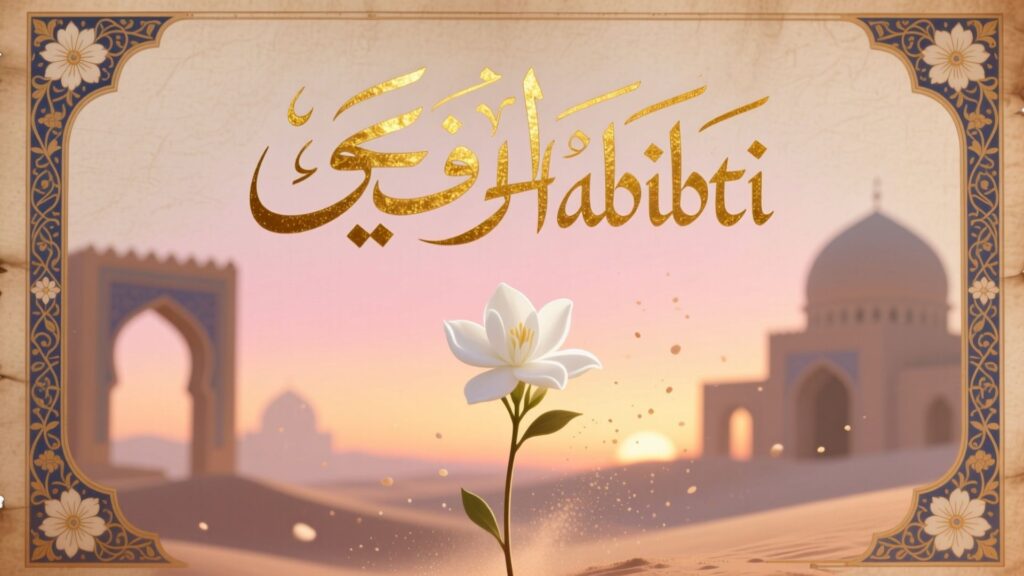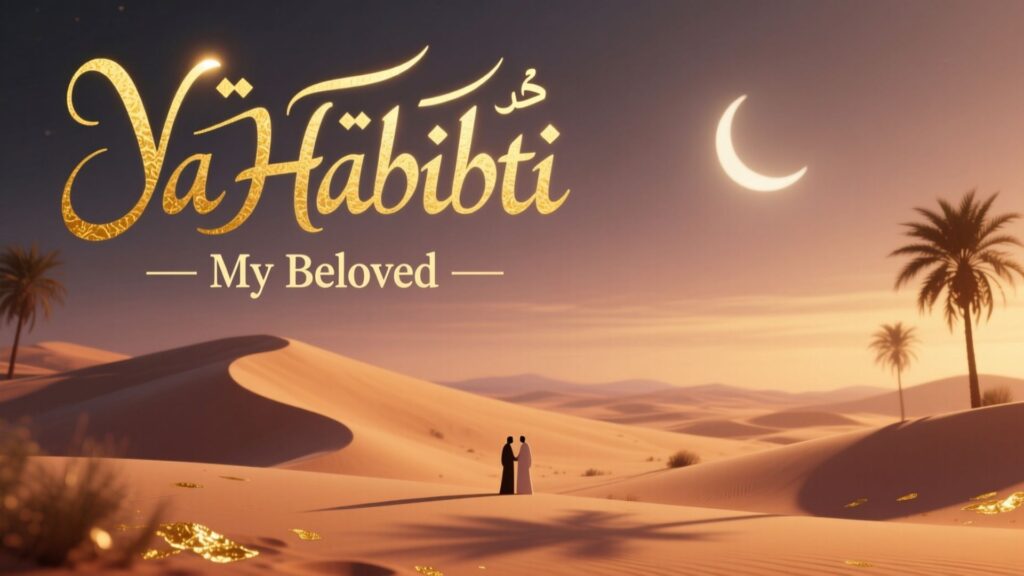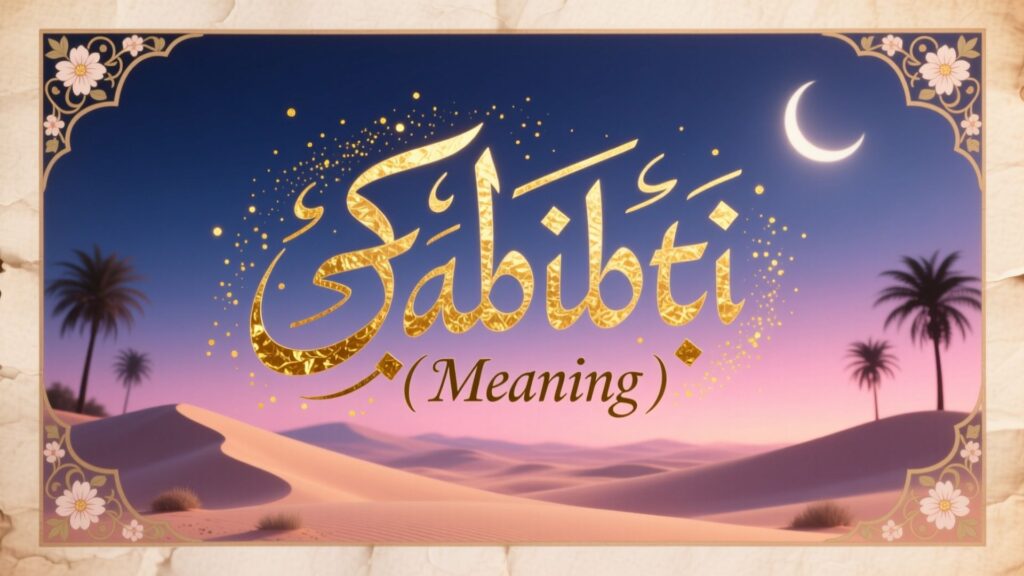When you ask what does habibti mean, you’re tapping into more than just a translation. You’re opening a door to language, culture, emotion, and etiquette. In this post, you’ll discover the meaning, usage, variants, and alternatives of habibti meaning in English. You’ll learn nuance, not fluff.
What Does “Habibti” Mean – A Deep Dive into Translation and Emotion

When someone asks what does habibti mean, they usually expect “my love” or “my darling.” But habibti meaning goes deeper.
- In Arabic, حبيبتي (habibti) literally translates to “my beloved (female)” or “my darling (to a woman).”
- The root word is حبيب (ḥabīb), meaning “beloved” or “dear,” plus the suffix ـتي (-ti) which makes it possessive and feminine.
- In English usage, habibti meaning in English often maps to “my dear,” “sweetheart,” “my love,” or “my darling.”
So, when someone uses what does habibti mean, they’re not merely hunting for a word they’re seeking the emotion, context, and cultural vibe wrapped inside it.
Origin and Linguistic Background
Understanding where habibti comes from helps you use it more wisely.
- The Arabic root ḥ-b-b (حبّ) refers to love, affection, liking. From it comes ḥub (love), ḥabīb (beloved), ḥabība (female beloved).
- Habibti is a possessive form: you add the “ـي” ending (-i) to mean “my,” and the “ت” (ta) to mark feminine: ḥabība + ti = ḥabībti.
- In standard Arabic, a more formal version is habibati (حبيبَتي) but in colloquial speech, people often shorten it to habibti.
- Over time, habibti entered everyday speech in many Arabic dialects, especially in the Levant, Gulf, and North Africa. Its popularity spread further through music, films, and social media.
So when someone wonders what does habiti mean, they’re likely misspelling habibti, which is more commonly used.
When and How to Use “Habibti”
You can’t just sprinkle habibti into any conversation and expect it to land well. Context, tone, and relationship matter.
Common Contexts of Use
You’ll often hear habibti in these settings:
- Romantic relationships from partner to partner
- Family a parent calling a daughter, or a sibling addressing sister
- Close friendships between people comfortable with affectionate language
- Affectionate chats within social groups where endearments are normal
Tone and Intent
Tone changes meaning. A warm, soft habibti feels loving and safe. A flippant or overly familiar habibti might feel presumptuous if used with someone you’re not close to.
Dos and Don’ts
| ✅ Do | ❌ Don’t |
|---|---|
| Use habibti with someone you already share emotional rapport with | Use habibti with strangers or in very formal environments |
| Match your tone and phrasing to the depth of your relationship | Use it to flirt casually where it may be misinterpreted |
| Pay attention to gender habibti is for females | Use habibti toward a male (should use habibi) |
| Use alternatives if you want warmth but less intimacy | Force habibti where it doesn’t feel natural |
In short: use habibti when your bond allows it, not just because you like the sound.
Example Sentences with “Habibti”
Here are authentic examples to anchor your understanding of usage. Use them, adapt them, but feel them:
| Arabic | English Translation | Context / Notes |
|---|---|---|
| صباح الخير، حبيبتي | Good morning, my love | Romantic greeting |
| شكراً يا حبيبتي على مساعدتك | Thank you, my darling, for your help | Gratitude with affection |
| لا تقلقي حبيبتي، أنا معك | Don’t worry, habibti, I’m with you | Reassurance |
| كيف حالك اليوم يا حبيبتي؟ | How are you today, my dear? | Casual check-in |
| إنتِ أجمل، يا حبيبتي | You’re the most beautiful, habibti | Compliment |
Each translation reflects the intended tone not just literal meaning.
Cultural Nuances and Potential Misunderstandings
Words carry weight beyond their dictionary definitions. Habibti is no exception.
Gender, Respect & Boundaries
- In Arab cultures, men and women often observe certain boundaries, especially if they’re not family or married. Saying habibti to a woman who is not expecting it may be seen as crossing a line.
- In professional or formal settings, using habibti can appear unprofessional or overly intimate.
- Tone and setting may shift a phrase from sweet to flirty or even awkward.
Cultural Adoption vs. Appropriation
Because habibti has spread globally, non-Arabic speakers often use it in memes, captions, or flirtation. But context matters. Using habibti playfully or in a joking way is usually fine among friends. Using it for strangers or large audiences can feel like you’re borrowing affection symbolically without fully respecting the culture.
Pop Culture Examples
- Many Arabic songs feature habibti, adding to its global recognition.
- Social media captions use “Good morning, habibti” as a mood booster.
- In media coverage of language usage, journalists caution against calling a colleague habibti.
Regional Differences
- In the Gulf, pronunciation may shift slightly (vowels, stress).
- In the Levant (Lebanon, Syria, Jordan, Palestine), habibti is among the most common affectionate terms.
- Some regions favor the formal habibati in writing but use habibti in speech.
Habibti vs. Habibi: What’s the Difference?
You might see what does habibti and habibi meaning used side-by-side but they’re gendered forms of the same sentiment.
| Term | Gender Addressed | Meaning | Use Case |
|---|---|---|---|
| Habibti (حبيبتي) | Female | My darling, my love (female) | Use when speaking to a woman |
| Habibi (حبيبي) | Male | My darling, my love (male) | Use when speaking to a man |
- Though habibti is standard for females, in poetic or artistic usage, habibi sometimes appears when addressing women, especially to preserve poetic meter or rhythm.
- Some sources consider habibti to be colloquial while habibati is more formal (though both mean the same).
Example dialogue:
Ahmed (to his sister): صباح الخير يا حبيبتي
Layla (to her brother): صباح النور يا حبيبي
Alternatives to “Habibti” (Romantic, Friendly & Polite Options)

If habibti feels too intense, or you want variety, here are alternatives categorized by tone.
Romantic / Poetic Alternatives
- يا حياتي (ya hayati) “my life” (Arab America)
- روحي (ruhi / rohi) “my soul” (natakallam.com)
- يا عمري (ya omri) “my lifetime / my age” (Arab America)
- حبيبتي قلبي (habibti qalbi) “my darling of my heart” (natakallam.com)
- English equivalents: “darling,” “sweetheart,” “my love,” “dearest”
Friendly / Familial Alternatives
- يا جميلة (ya jameela) “beautiful (female)”
- حبيبة (habiba) “beloved / female beloved”
- Excellent English choices: “honey,” “sweetie,” “dear friend”
Polite / Neutral Alternatives
Use these when you want warmth but not deep intimacy:
- Call them by their name
- Use ma’am / miss
- Phrases like “take care,” “best wishes,” or “warm regards”
Here’s a helpful quick-reference:
| Expression | Style / Tone | Use Case |
|---|---|---|
| ya hayati | Romantic / deep | Heartfelt love |
| ruhi | Spiritual / soulful | Very close connection |
| honey / sweetie | English casual | Informal, friendly |
| name / ma’am | Neutral | Formal or initial interactions |
Cross-Cultural Comparisons: Affection Across Languages
It helps to see how different tongues express similar emotion. Below is a table comparing habibti with equivalents in other languages:
| Language | Phrase | Literal Translation | Use / Notes |
|---|---|---|---|
| Arabic | habibti | “my beloved (female)” | Feminine endearment |
| Spanish | mi amor | “my love” | Romantic & friendly |
| French | mon amour | “my love” | Romantic |
| Italian | cara mia | “my dear (female)” | Romantic / affectionate |
| Urdu / Hindi | جان (jaan) | “life / beloved” | Deep affection |
| Turkish | sevgilim | “my beloved” | Romantic / affectionate |
Each language has shades of intimacy. Habibti often feels more poetic, deeply affectionate, and culturally layered.
Common Misuses, Trends & Usage in 2025
Even beloved words can be misused when they go viral on social media.
Misuses to Watch Out For
- Calling habibti to someone you barely know it can come off as overfamiliar or cheesy.
- Using habibti in a business, formal or public environment where it raises eyebrows. (The National)
- Treating habibti like a catchphrase or meme without sensitivity to its cultural weight.
Trends in 2025
- On TikTok, captions like “Good morning, habibti” go viral as aesthetic or affectionate greetings.
- Influencers sometimes mix habibti with English phrases: “You’re my habibti forever”.
- Some brands in the Arab world use habibti (or habibi) in campaigns harnessing the emotional pull.
- Journalists warn not to drop habibi/habibti casually in professional speech. (The National)
Case study: A Middle Eastern café chain launched a marketing campaign using “Welcome, Habibti / Habibi” as a greeting inside stores. The ad went semi-viral some customers felt warm, others felt it overstepped because they didn’t expect personal address by a brand.
Modern-Day Relevance: Why Habibti Still Matters
Why does habibti remain popular? Because words carry emotional weight and culture is dynamic.
- In multicultural settings, habibti becomes a bridge between languages and emotions.
- Using habibti signals warmth, familiarity, and cultural fluency.
- In digital age, expressive words are currency habibti gives emotional texture.
- Brands and creators use it for engagement but those who use it with care get more respect.
Summary: Key Takeaways
- What does habibti mean? It means “my beloved (female)”, “darling,” “my love.”
- Use habibti only when the relationship and context allow it’s affectionate, not casual.
- The masculine counterpart is habibi.
- Alternatives like ya hayati, ruhi, or English terms can suit different tones.
- Be sensitive to boundaries and cultural context especially as a non-native speaker.
- In 2025, habibti remains alive and evolving, thanks to art, social media, and cross-cultural exchange.
Bugti is the founder of Quoethint.com, a hub for English language tips, writing advice, and grammar guidance. With years of experience in English studies and a passion for clear communication, Bugti created this platform to make grammar and writing easy to understand for everyone.
